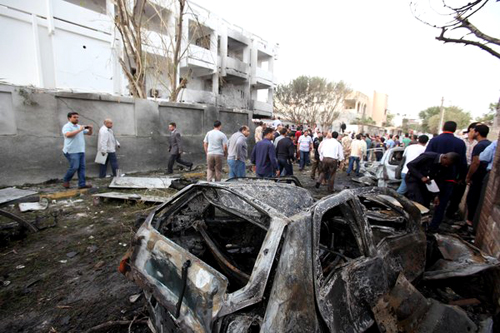
Fight Racism! Fight Imperialism! 233 June/July 2013
On 2 April 2013 HMS Kent docked in Tripoli harbour, the first visit to Libya by a Royal Navy warship in 40 years. It hosted a UK Trade and Investment event which saw 11 UK businesses – including BAE, Thales and Babcock International – vie to secure lucrative security contracts. Over 100 Libyan military personnel were in attendance, including the heads of all five armed services and the police. Naval Commander Ben Ripley praised the ‘thoroughly enjoyable and rewarding visit’ and its ‘potential wider benefits for the UK’. On 10 May the British embassy evacuated all non-essential staff from its Tripoli premises, issuing a joint plea for calm with the French and US governments amid political instability sweeping the country – the newly-established US marine unit at Moron Air Base in southern Spain and an AFRICOM special-ops force based in Stuttgart, were both placed on heightened alert. Imperialism has opened Pandora’s box in Libya; it must deal with the consequences.
Terror rules the roost
On 13 May, a car bomb detonated outside a hospital in Benghazi, killing nine and wounding 30 others. The likely culprits are one of the many armed militia groups roaming the country, former anti-Gaddafi fighters supported by NATO during the 2011 war. Militia-led attacks are part of daily life in Libya; since the beginning of April there have been three car bombings, five targeted assassinations, seven attacks on security services and dozens of gun battles across the country. Between 28 April and 10 May militias blockaded the Foreign and Justice Ministries in Tripoli; security services were powerless to remove them, only withdrawing after negotiations with a committee of government officials. The British government has issued warnings to travellers against visiting eastern Libya, which is run as a series of fiefdoms headed by militias. For the imperialists these militias threaten the security of their investments; on 2 April militias attacked the Field 103-Zueitina oil pipeline in eastern Libya, while their presence in the south has been discussed by BP and Libyan government officials. In April French oil services contractor Ponticelli withdrew from Libya, citing security concerns; on 13 May BP partially followed suit.
The Libyan government is eager to reassure the imperialists that the situation is under control. On 16 March the Libyan government launched Operation Tripoli to clear 500 locations around the capital of armed gangs and militias. This effort, as so many before it, has proven totally toothless – the Libyan government is both dependent on the militias and incapable of controlling them.
Auctioning Libyan assets, dismantling state welfare
The imperialists have their eyes fixed on the oil industry; Libya possesses Africa’s largest crude oil reserves, income from which made up 64% of GDP in 2010. In 1973 the Gaddafi-led government nationalised foreign oil producers, and while later reforms partially re-opened the sector they did so on terms dictated by the state – foreign firms could only operate through joint ventures with Libyan companies, and faced substantial taxes on profit. The 95% tax on oil production – has now been slashed to 75%, on a par with oil-producing states like Norway and Russia. The ‘Jihad tax’ – an additional 4% tax on net profits – has been abolished. Eni, Total and Suncor have already signed exploration and product sharing agreements with the Libyan government, while BP’s $2bn deep sea drilling programme in the Sirte Basin is set to begin later this year. The deteriorating security situation may prevent these.
State control of oil production enabled Libya to implement a robust system of state welfare, giving Libyans the highest per-capita income in Africa and a life expectancy of 75 years. Now, with the industry being auctioned off to the imperialists, this welfare system is being dismantled. A three-year plan to terminate state fuel subsidies was announced – the former government subsidised 75% of the cost to Libyan households. The Minister for Social Affairs has made the future of the state welfare very clear: ‘families must support themselves financially and not rely on the government’. This in a country where estimated unemployment rates vary between 15-30%!
Criminalising dissent
The militias and government have been able to collaborate in the systematic repression of Libyans who did not support the NATO assault. Some 8,000 Libyans are still held without charge or representation, simply because they supported the Gaddafi government. Saif Al Islam, Colonel Gaddafi’s son, has been held for 17 months without access to meaningful judicial process, facing a trial described by his lawyer, John Jones QC, as ‘a farce from start to finish … his detention is Libya’s Guantanamo Bay’. Former intelligence chief Abdullah Al Senussi has spent eight months in prison without access to lawyer. On 20 March actor Yousif Gheryani was sentenced to five years imprisonment simply for ‘having opposed the 17 February revolution’. On 5 May the Libyan Congress passed the Political Isolation Law, banning citizens with links to the Gaddafi government from prominent positions in Libya; as many as 500,000 people’s jobs are threatened.
For the majority of Libyans the clock has been turned backwards. Sirte – a town of 100,000 people– remains destroyed, its citizens living among the ruins. The 30,000 former residents of Tarwergha, a majority black town, driven out by rebels in October 2011, have been subjected to angry demonstrations in Misrata; on 18 May supporters of the new government rallied in the city centre demanding they be stripped of their right to return. Bani Walid, a pro-Gaddafi town besieged by the new government in 2012, is under military occupation; a motorised unit of 35 vehicles arrived in the city on 3 February to reinforce the brigade already stationed there. Terror, austerity and plunder – this is the legacy imperialism has left in Libya.
Jack Edwards




